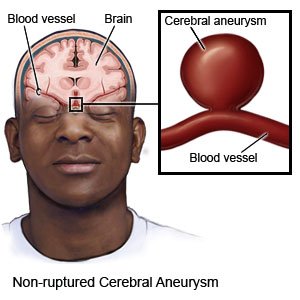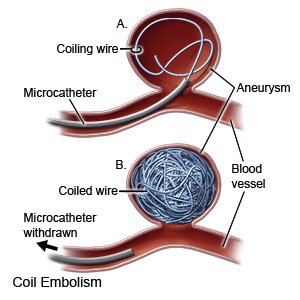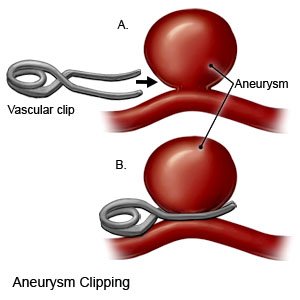Nonruptured Cerebral Aneurysm
Medically reviewed by Drugs.com. Last updated on Sep 23, 2025.
What is a nonruptured cerebral aneurysm?
A nonruptured cerebral aneurysm is a bulge in an artery in your brain that has not burst. An aneurysm can form in an artery that has not developed correctly or is weakened. Treatment may be needed to help prevent your aneurysm from growing and bursting. A burst cerebral aneurysm is known as a stroke. A stroke is a life-threatening emergency.
 |
What are the warning signs of a stroke?
The words BE FAST can help you remember and recognize warning signs of a stroke:
- B = Balance: Sudden loss of balance
- E = Eyes: Loss of vision in 1 or both eyes
- F = Face: Face droops on 1 side
- A = Arms: Arm drops when both arms are raised
- S = Speech: Speech is slurred or sounds different
- T = Time: Time to get help immediately
 |
What increases my risk for a cerebral aneurysm?
- A family history of aneurysms, especially in a parent, sibling, or child
- High blood pressure or atherosclerosis (hard or stiff artery)
- Medicines that can increase your blood pressure, such as birth control pills
- Drinking large amounts of alcohol, or using cigarettes or stimulating drugs such as cocaine
- Certain genetic conditions, such as polycystic kidney disease
- A connective tissue disorder such as Marfan syndrome or vascular Ehlers-Danlos syndrome
- Endocarditis (infection in the inner lining of your heart)
What are the signs and symptoms of a cerebral aneurysm?
You may have no signs or symptoms. Your aneurysm may grow, press on nerves, and cause symptoms. Any of the following may mean your aneurysm is at risk for bursting:
- A severe headache on 1 side of your head
- Pain above and behind 1 or both eyes or sensitivity to light
- Dilated (wide) pupil in 1 eye
- Vision changes, loss of vision in 1 eye, or double vision
- Pain, numbness, or weakness in your face, or not being able to move 1 side of your face
- Eyelid drooping or not being able to move 1 eye
- Nausea or vomiting
How is a nonruptured cerebral aneurysm diagnosed?
A nonruptured aneurysm is usually found during tests for another condition. Your healthcare provider may examine you and ask about your symptoms. Tell your provider if you have a family history of aneurysms. Tell your provider about all medicines you currently take. You may be given contrast liquid to help the aneurysm show up better in pictures. Tell the healthcare provider if you have ever had an allergic reaction to contrast liquid. You may need any of the following:
- A CT or MRI may show the aneurysm. Do not enter the MRI room with anything metal. Metal can cause serious injury. Tell the healthcare provider if you have any metal in or on your body.
- An angiogram may show the aneurysm or be used to check the size or position. This can help your provider plan your treatment.
How is a nonruptured cerebral aneurysm treated?
Your aneurysm may only need treatment if it grows or you have symptoms. Treatment may instead be needed to prevent the aneurysm from bursting. Your provider may recommend treatment if you have a family history of burst aneurysms. You may need any of the following:
- Blood pressure (BP) medicine may be needed to lower your BP to help prevent your aneurysm from growing and bursting.
- Cholesterol medicine may be needed to lower your cholesterol level. This can also help prevent atherosclerosis or a stroke.
- Antiplatelets , such as aspirin, help prevent blood clots. Take your antiplatelet medicine exactly as directed. These medicines make it more likely for you to bleed or bruise. If you are told to take aspirin, do not take acetaminophen or ibuprofen instead.
- Endovascular repair is a procedure to protect your artery and prevent your aneurysm from growing or bursting. Your provider may use a coil (metal wire) to fill your aneurysm. This changes the blood flow pattern within the aneurysm and creates a seal. Your provider may instead place a mesh tube called a stent in the artery. This is called a flow diversion stent and directs blood flow away from the aneurysm.

- Surgery may be done to protect your artery and prevent your aneurysm from growing and bursting. Your provider may put a metal clip on your aneurysm. This can help prevent blood from moving into your aneurysm. This metal clip will stay in place permanently. Over time, your aneurysm may get smaller and go away.

How can I manage a cerebral aneurysm?
- Manage other health conditions that may cause an aneurysm to form, grow, or burst. Examples are stress and high BP. Manage stress by learning new ways to relax, such as listening to music. Ask about medicines you take that can raise your BP, such as certain birth control pills. Check your BP as directed if you have high BP. Your provider will show you how to do this. Check your BP 2 times, 1 minute apart. Check as often as directed each day. Keep a record of your readings and bring it to your follow-up visits.

- Follow recommended meal plans. Talk to your provider or a dietitian about a heart-healthy or low-sodium meal plan. These meal plans may help you lower your cholesterol and BP levels and maintain a healthy weight. Heart-healthy meal plans are low in sodium, processed sugar, and some fats. They are high in potassium, calcium, heart-healthy fats, and fiber. These can be found in vegetables, fruit, and whole-grain foods.

- Be physically active, as directed. Your provider can help you create a safe physical activity plan. The plan may include low-intensity activity, such as walking, yoga, or swimming. You may need to avoid intense physical activity, such as weightlifting or running. Intense activity may raise your BP.

- Do not use tobacco products or stimulating drugs. Nicotine and drugs such as cocaine increase your risk for an aneurysm to form, grow, or burst. They can also damage blood vessels and increase your BP. Ask your provider for information if you currently use tobacco products or stimulating drugs and need help to quit. E-cigarettes or smokeless tobacco still contain nicotine. Do not use these in place of cigarettes. Avoid secondhand smoke.
- Know the risks if you choose to drink alcohol. Alcohol can increase your BP and your risk for an aneurysm to form, grow, or burst. Ask your provider if it is okay for you to drink any alcohol. Your provider can help you set limits for the number of drinks you have within 24 hours and within 1 week. A drink of alcohol is 12 ounces of beer, 5 ounces of wine, or 1½ ounces of liquor.
- Talk to your provider about pregnancy, if needed. You may need tests before and during pregnancy to check the aneurysm. You may also need medicine if you have a condition that increases your risk for a burst aneurysm. An example is high BP. Your provider can also help you plan a safe delivery if you are at high risk for a burst aneurysm.
What do I need to know about screening for a cerebral aneurysm?
- Screening means you are checked at least 1 time based on family history and your personal risk factors. You should be screened if 2 or more family members have had cerebral aneurysms. You may need a blood test to check for a genetic condition that can cause aneurysms.
- Your parents, siblings, or children may also need to be screened.
- The benefit of screening is that your provider can diagnose a cerebral aneurysm early. This helps your provider monitor your aneurysm and start treatment, if needed. Early diagnosis and treatment can help prevent your aneurysm from growing and bursting. Screening can also help you have a healthy pregnancy.
Have someone call your local emergency number (911 in the US) if:
- You have any of the following signs of a stroke:
- Numbness or drooping on one side of your face
- Weakness in an arm or leg
- Confusion or difficulty speaking
- Dizziness, a severe headache, or vision loss

- You are confused.
- You have a seizure.
- You lose consciousness.
When should I seek immediate care?
- You have a fever.
- You have a severe headache on 1 side.
- You have pain, numbness, or weakness in your face.
- You cannot move 1 side of your face.
- You have pain above and behind 1 eye, or you cannot move 1 eye.
- You have a wide pupil in 1 eye.
- You have a stiff neck or trouble walking.
- You have nausea or are vomiting.
- You have blurred or double vision, or you are sensitive to light.
- Your muscles suddenly feel weak.
- You had a head injury.
When should I call my doctor or specialist?
- You want to start family planning.
- You feel anxious or depressed about your condition.
- You have questions or concerns about your condition or care.
Care Agreement
You have the right to help plan your care. Learn about your health condition and how it may be treated. Discuss treatment options with your healthcare providers to decide what care you want to receive. You always have the right to refuse treatment. The above information is an educational aid only. It is not intended as medical advice for individual conditions or treatments. Talk to your doctor, nurse or pharmacist before following any medical regimen to see if it is safe and effective for you.© Copyright Merative 2025 Information is for End User's use only and may not be sold, redistributed or otherwise used for commercial purposes.
Further information
Always consult your healthcare provider to ensure the information displayed on this page applies to your personal circumstances.
